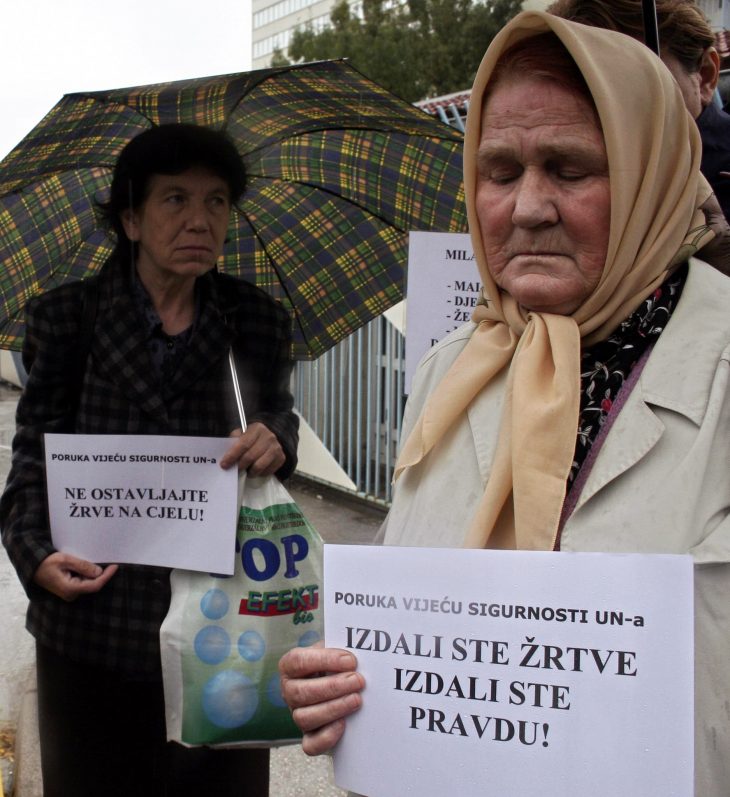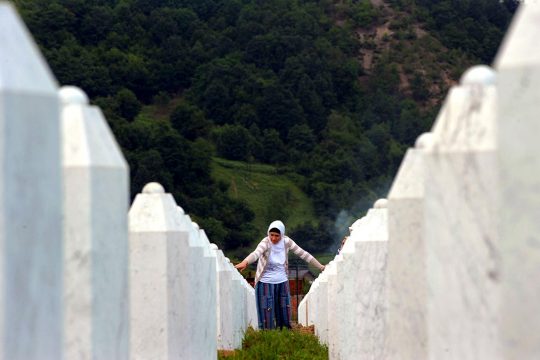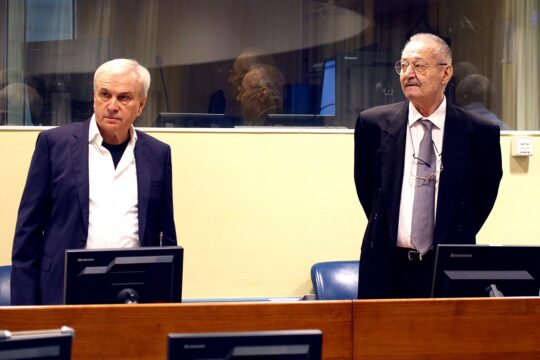Bringing justice to female survivors of wartime rape in Bosnia and Herzegovina is still a main concern in the field of international justice. “Over 20 years after the end of the conflict, wartime victims are still paying a high price for the harm they suffered”, says Adrijana Hanušić Bećirović, a senior legal adviser at Trial International organization.
Whilst a three and a half year war was ended by the Dayton peace agreement in 1995, sexual violence victims feel neglected by the lack of effective enforcement of compensation awards. Swiss NGO TRIAL International, based in Geneva since 2012, has just released a report on this, entitled "Compensating survivors in criminal proceedings : perspectives from the field".
In the following interview, Bećirović, who has joined Trial International, talks about transitional justice mechanisms in Bosnia and Herzegovinia related to the process of awarding compensation in war crimes trials.
Justice Info: Could you perhaps first tell us about the project advocating for women victims of wartime sexual violence to obtain justice and reparation?
Adrijana Hanušić Bećirović : TRIAL International has been active in Bosnia and Herzegovina since 2008, providing free legal support to wartime victims of international crimes. As part of our program there, we have been advocating for the prosecution of sexual violence crimes before domestic judicial bodies, as well as for the provision of compensation to victims for the harms suffered. Through a unique strategic approach combining advocacy, litigation and outreach, TRIAL International has contributed to an increase in both prosecutions for wartime sexual violence before domestic courts and in the number of victims coming forth to claim their rights. Our most significant result has been the historic awarding of compensations to two victims of wartime sexual violence within criminal proceedings, along with the sentencing of the perpetrators, at the Bosnia and Herzegovinia (BiH) Court in June 2015. Since then, a total of five sexual violence cases have been decided in the same way before domestic courts.This positive practice has now started before lower-level courts as well. Educational and counselling programs aimed at prosecutorial and judicial staff are now encompassing the topic of compensation claims in criminal proceedings. TRIAL International has recently trained around twenty legal representatives on how to effectively represent victims, thereby setting up a network of potential aid providers for victims.In addition, TRIAL International has recently channeled legislative amendments, which will entitle victims in criminal proceedings to free legal aid before the Bosnia and Herzegovinia Court – victims have been complaining about that shortcoming for years. The next crucial step will be to ensure the effective enforcement of compensation awards. To achieve that, we will on the one hand encourage prosecutors to muscle up their financial investigations on the perpetrators’ assets, and to order the freezing of those assets. On the other hand, we will advocate for the state to set up a fund from which payments could be made when perpetrators do not have the assets.
Justice Info: The report tackles compensating survivors in criminal proceedings. To what extent, does the society still concern about this issue after more than 20 years of wartime?
Unfortunately, we sense a certain fatigue in regard to wartime issues in Bosnia and Herzegovina. With the economic crisis, officials make it clear that victims’ compensation is no priority in the budget. Even pensioners may not receive regular monthly payments anymore! Nonetheless, there are also positive signs. The first compensation award to victims in criminal proceedings has been saluted by society at large and we could feel a real empathy toward the victims. This is a sign that sooner or later, justice is somehow achievable for war crimes victims.
Justice Info: Trial’s latest report focuses on “non-pecuniary damages”, could you explain further these damages? How do they affect the survivor’s life?
The term “non-pecuniary damages” refers to the mental suffering caused by the violation of rights related to dignity, as well as the violation of the right to freedom. Those damages are numerous and have tragic consequences for the victims. It refers for example to continued PTSD (Post-traumatic Stress Disorder) symptoms, such as anxiety and emotional suffering; the impairment of family life, as well as of marital or social relationships; the impairment of physical and mental abilities; a degradation of the victim’s lifestyle when for instance they forfeit their education after the crime because they simply couldn’t cope.
Justice Info: The report criticized heavily the state role call in relation with the procedures that enable wartime rape survivors/victims to exercise their rights and receive adequate protection”, what is your take on the current system?
Our take is that Bosnia and Herzegovinia needs a legislative solution to ensure that a collective, administrative mechanism establishes compensation payment. This will allow all victims in similar situation to access their rights equally throughout the whole country. It will also spare them emotional and financial difficulties. There has been several attempts over the last years to adopt such a law before the Parliamentary Assembly of Bosnia and Herzegovinia – every time, the political support for this initiative failed.
Justice Info: How do you evaluate the court-ordered compensation compared with other transitional justice mechanisms that have been implemented in Bosnia and Herzegovinia ? What is the difference between the merits of compensation in civil and criminal proceedings?
There is in fact no such mechanism in place to provide compensation to victims in Bosnia and Herzegovinia , which would be the optimal option. The country only counts with so-called disability pensions or monthly allowances for civil victims of war, but this is part of the social welfare system, not redress for the harm suffered, as required by international standards.
Only a limited number of victims will see their aggressors prosecuted and thus have a chance to claim compensation. Furthermore, while criminal proceedings are establishing the responsibility of individuals, civil proceedings are usually directed against one of the two political entities of Bosnia and Herzegovinia (the Federation of Bosnia and Herzegovina or the Republika Srpska, the Serbian entity of Bosnia and Herzegovina), or against the state itself. However, civil proceedings are lengthy, costly and can, under the current legal framework, fail to provide identity protection measures.
In addition, the most frustrating part of civil proceedings for victims is the total legal uncertainty regarding the statute of limitations claims. Depending on which court, - or even which judge - issues judgments, domestic laws are interpreted differently on the question of whether entities are bound to pay compensation. The unfortunate trend is to reject those claims by stating that the claims are time-barred – in contradiction to relevant international standards.
In some cases, like in Republika Srpska for example, the losing party is even forced to pay the costs of the proceedings, putting unbearable pressure on victims who have sued that entity.
In the end, not only are victims denied compensation, but they have to pay high sums to the entity they blame for their harm. Property seizing is not rare in those cases, causing unimaginable re-traumatization and condemning victims to a lifetime of poverty.
Justice Info: Trial International’s report described the survivor’s role in the current procedures “secondary and passive”, why? What is your approach on activating their role?
The classic approach to victims in criminal proceedings in Bosnia and Herzegovina is limited to using their testimony as evidence. Imagine the prosecution of a sexual violence crime – the victim has waited for years for justice to be served, and when proceeding finally starts, she is prepared to talk about the harm she suffered and her feelings. But in the end, she will attend a single hearing where she will have very little room to share her story, and her feelings. Her part will then be over and her claims will remain ignored. The victim can end deeply hurt, as the expectations she may have been building up for years will not be met. I have witnessed an instance where our client, whom we had helped to prepare closing remarks, saw her speech interrupted after a few sentences by the presiding judge. Thrown off balance, she could not pick it up again and never had another chance to share her story.
Conversely, the survivor’s role turns into an active one when she receives legal aid and prosecutors and judges address compensation claims in criminal proceedings. The victim feels that the harm she has suffered is being paid particular attention to. The symbolic message of a compensation award is strong: it is a societal recognition of what she went through. In that sense, it also holds strong preventive potential. Apart from the perpetrator’s prison sentence, a special obligation arises towards her individually. It is a powerful satisfaction and, after years of perceived neglect of their rights, victims finally feel empowered.
Justice Info: TRIAL International’s report suggested “a constructive mode of reparations for war crimes survivors who have the status of injured party at trial”, what are the main points of this approach?
We found that compensation ordered by a criminal court serves several positive functions. It recognizes the harms that survivors have suffered; it reaffirms societal condemnation of wartime crimes; helps deter future such offenses; it empowers survivors; it builds trust in the legal system and it finally facilitates personal rehabilitation.
According to the victims we have interviewed, these symbolic benefits take precedence over material gain, making court-ordered damages worthwhile despite the fact that verdicts enforcement is a whole new battle altogether. At TRIAL International, we believe that Bosnia and Herzegovinia society must do more to acknowledge this harm and find new and better ways to address it.






